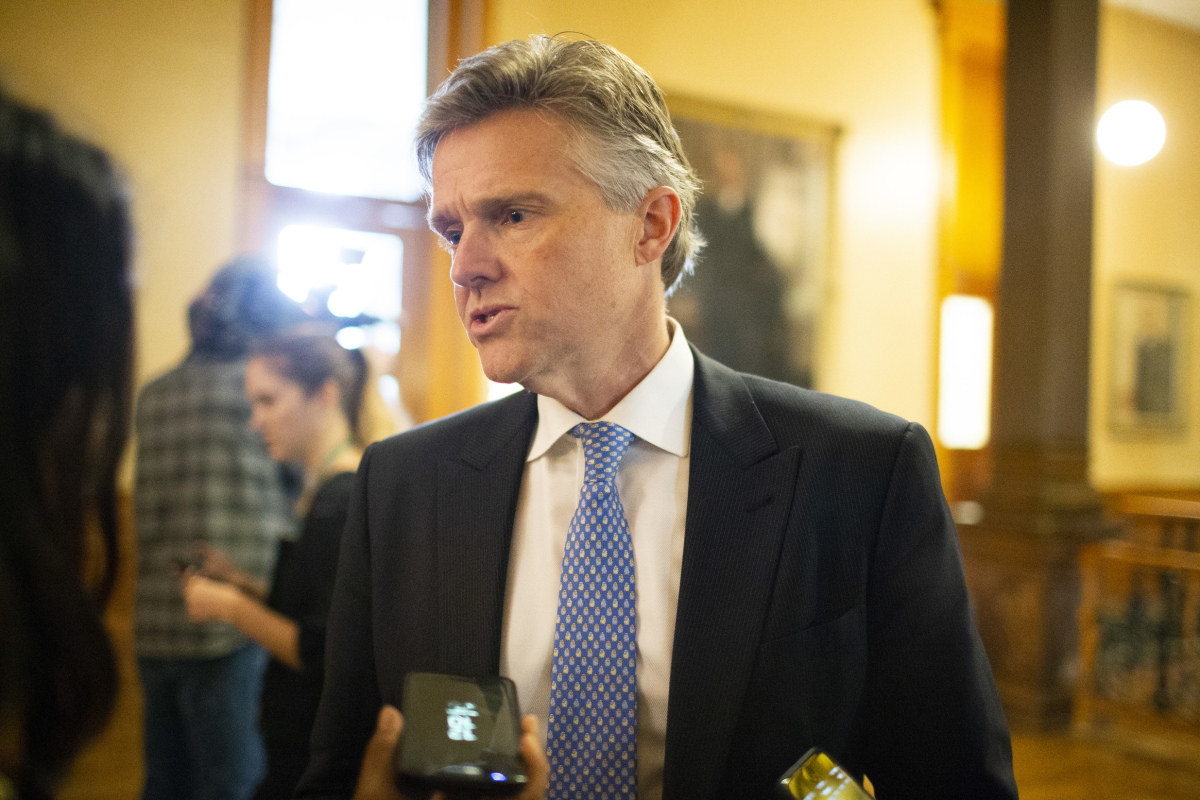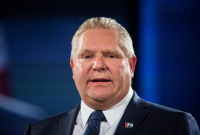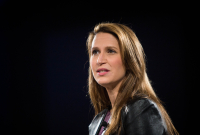Support strong Canadian climate journalism for 2025
The right-leaning government of Canada's most populous province is musing about introducing its own plan to make polluters pay, just as it is rejecting the federal government's efforts to do the same thing.
Premier Doug Ford's Progressive Conservatives have been crusading against carbon taxes since they entered office after their election victory June 7. The latest comments by Ontario Environment Minister Rod Phillips indicate that the government has something similar in mind that would target companies, which could theoretically pass their costs on to consumers.
"We want to focus on how technology can make a difference and particularly focus on making sure the polluters are paying and not ordinary Ontarians," he told National Observer.
The minister asserted that Ontario is well on its way to reaching its 2030 target to reduce greenhouse gas emissions levels by 37 per cent from what it was in 1990.
But after 100 days in office, it is still not clear what the Ford government's climate plan will look like, what it means for the environment, and how it will affect Ontarian's wallets.
Immediately after forming government, Ford pulled Ontario out of a cap and trade market with Quebec and California that allowed private businesses to find the cheapest ways to reduce greenhouse gas emissions. That decision put Ontario at odds with the federal government's commitment to ensure that all provinces set a minimum price on heat-trapping pollution to ensure that businesses and citizens are no longer allowed to pollute for free.
Prime Minister Justin Trudeau has said that carbon pricing is a key part of its national climate change strategy and he plans to impose a minimum rate on provinces that fail to comply on their own by January. Trudeau's government has committed to returning the revenues collected from its carbon pricing program directly to provincial residents.

Trudeau's carbon pricing policy was the focus of Ford's speech at an Oct. 9 rally to celebrate his government's first 100 days in office. “It’s nothing but a scam. It does nothing - zero - to help the environment,” the premier told hundreds of supporters. This was just two days after the United Nations Intergovernmental Panel on Climate Change released a report warning there are only 12 years left to contain global warming to a maximum of 1.5C before climate catastrophe hits.
As the government has been considering what to do next, a public consultation was held on legislation to formally repeal Ontario's participation in the cap and trade market. The consultation that began Sept. 11 concluded on Oct. 11.
The legislation mandates Phillips to produce a climate plan, which he has said will include an emissions reduction fund, the details of which are being worked out. The plan will be released in the fall after reviewing submissions from the public, and will not include cap and trade, carbon pricing, or any green energy legislation enacted under the former Liberal government, he said.
"We have made clear that we don't think a carbon tax or cap and trade are the right answer," Phillips said during a brief interview at Queen's Park on Oct. 3 following question period. Without delving into details, Phillips noted that a lot of alternative suggestions have come in. "It'll all be in the plan," he said.
A focus on technology flies in the face of peer-reviewed research by award-winning scientists
The Royal Swedish Academy of Sciences recently awarded economists William Nordhaus and Paul Romer with the Nobel Prize in economic sciences for research demonstrating that economic forces such as carbon taxes can drive solutions to climate change. The academy said that their recent work goes beyond previous research that found technological innovation could drive economic growth. The academy noted that research by Norhaus concluded that the "most efficient remedy for the problems caused by greenhouse gas emissions would be a global scheme of carbon taxes that are uniformly imposed on all countries."
In Alberta in 2007, the then Conservative government introduced a carbon levy on industrial emitters of $15 per tonne of carbon dioxide above a set limit, and put the money into an emissions management fund. Notley replaced that with a more comprehensive climate change plan in 2015 that included a broader carbon tax with rebates going back to citizens. Notley said recently Alberta is withdrawing from the national climate policy until the Trans Mountain pipeline was back on track. She said Alberta would keep the current price of carbon at $30 per tonne, rather than increasing it to $40 in 2021 as planned under the federal climate agreement.
In recent months, Ford has teamed up with Alberta Opposition Leader Jason Kenney, who has vowed to kill the provincial carbon tax. Ford has campaigned with Kenney and the Alberta United Conservative Party against New Demoratic Party Premier Rachel Notley in the fossil fuel-dominated province that is home to the world's third largest reserves of crude oil, after Saudi Arabia and Venezuela. Neither Ford nor Kenney have provided any evidence to show how they would avoid higher economic costs associated with the impacts of climate change.
In an Oct. 9 interview with CTV's Don Martin, Ford said the government was working on a "robust plan" to ensure that Ontario had clean air, clean water and clean parks. He offered no details, apart from paying a visit to poor environmental stewards.
"But you have to have confidence in the corporations in Ontario and the ones I visit — and I visited quite a few of them over the last few months — they're good stewards on the environment and they want to do their best," Ford said. "And I can assure you that (for) anyone who doesn't want to be a good steward of the environment, we're going to come down on them so heavy, they won't know what hit them. So we're going to make sure that we support the companies that are good stewards, and the ones that aren't, well, we're going to pay them a visit."
In response to an email about the polices his ministry had enacted over the first 100 days of the Ford government, Phillips said the upcoming provincial "made-in-Ontario solution to address climate change" would be the "first step and major part of our comprehensive environmental plan to build a resilient Ontario, protect our waters and air, clean up our communities and conserve our resources.”
At the Ontario Energy Association's annual conference on Sept. 24, Phillips said the provincial plan will be "more balanced" than previous climate policies, will save taxpayers' money and encourage job creation, while fighting climate change.
"We will strike the correct balance between a healthy economy and a healthy environment, and put the onus of pollution on polluters, not on the hard-working people of our province," Phillips said at the conference. "Our plan focused on solutions, not one that has the government picking winners and losers."
Eliminating the cap and trade program will save more than $1.9 billion in 2019, he said.
In a Sept. 24 interview with CBC Radio’s Metro Morning, Phillips acknowledged that Ontario needs to prepare for climate change. "Absolutely, I see the connection between what we are doing to the environment and these extreme weather events. We need to prepare for the changes that are coming," he said. "These kinds of severe weather events are going to continue to happen."
Phillips told CBC his plan, which will include an emissions reduction fund, will focus on reducing greenhouse gases: "We are focusing on the polluters, in terms of people producing the most emissions, not on individual families and people."
Carbon pricing, he told CBC, does not change behaviour at all.
A controversial public consultation
Bill 4, also known as the Cap and Trade Cancellation Act, requires a climate change plan that must include targets for greenhouse gas emission reductions and would allow the government to "revise the targets from time to time."
These targets will not be legislated and can be changed at any time by the minister, according to the bill.
The public consultation on the bill has been mired in controversy since the legislation was first proposed on July 25. The Ontario legislature adjourned for the summer without adopting it, despite the fact that an "orderly wind-down" of cap and trade and any programs paid with revenues it generated was one of Ford's first announcements in office.
Ontario's Environmental Bill of Rights states that the province’s residents have the right to a 30-day consultation process on environmentally significant regulations and legislation.
Ontario Green Party Leader Mike Schreiner has been running an online campaign to get Ontarians to raise awareness about this process. "If Bill 4 passes, it would end pollution pricing, ditch emissions targets and leave Ontario with no detectable plan for fighting the biggest crisis facing humanity," the campaign's messaging says. "Doug Ford does not have a mandate to turn Ontario into Canada's worst climate offender."
The government announced it would open Bill 4 for consultation three hours after a judge granted Greenpeace an expedited hearing for its legal challenge alleging that Ford “unlawfully” neglected to consult the people of Ontario when he tabled Bill 4, and that the Ford government's decision to withdraw from cap and trade was anti-democratic.
Since then, the environmental commissioner of Ontario, Dianne Saxe, has called Bill 4 "a license to do little or nothing in the face of our largest threat.” In a Sept. 25 report, Saxe noted the cap-and-trade system was complex and poorly communicated, but was on its way to delivering economic and environmental benefits for the province. Bill 4, she said, was “much too weak."
Federal and provincial Tories continue to brawl over climate change
On top of the bill, Ford's government is challenging the federal government's climate change policies in court. On Aug. 2, Phillips and Attorney General Caroline Mulroney said they were challenging the constitutionality of the federal government setting rules that require polluters to pay. They called the policy a "job-killing carbon tax" that was "unethical and unfair."
Ford and Phillips also quietly shut down the GreenON program, which was funded by cap-and-trade revenues to support energy retrofits in homes, small business and social housing, as well as solar power installations. The government also cancelled the Greenhouse Gas Reduction Fund for school boards, removing the $100 million it provided for school renovations.
On top of that, a nearly completed wind farm in Prince Edward County was cancelled, along with 758 renewable energy projects. The Hydro One CEO and board were removed. And the Drive Clean vehicle-emissions testing program was shut down.
The differing views between the two levels of government on climate policies have resulted in sharp exchanges on Twitter between Phillips and federal Environment Minister Catherine McKenna, who first met in July.
After an Oct. 5 anti-carbon tax rally in Calgary held by Ford and Kenney, Phillips tweeted that he is "proud of the leaders from across the country, who are uniting against regressive taxes." McKenna tweeted that his comment was "unbelievable."
"By killing their climate plan, Ontario is increasing pollution equal to over 30 new coal-fired plants," she wrote.
Phillips responded with a challenge. "What’s *unbelievable* is that 6 provinces (and counting) have rejected your ineffective carbon tax plan. Yet, you are still unwilling to work collaboratively on solutions to reduce GHGs that don’t tax the people. Ontario is on track to meet Paris 2020... how about you?" he wrote.
In an email to National Observer, Phillips has said the Ford government "remain(s) committed to fighting the federal government’s unconstitutional, regressive carbon tax which will drive up the cost of almost everything for consumers."
Consultations are ongoing for other climate-related legislation, including:
Repeal of the Green Energy Act: Oct. 21
Redesigning Ontario’s Drive Clean Motor Vehicle Emission Testing Program: Oct. 28
Amendments to the Renewable Energy Approvals Regulation: Nov. 5
With files from Steph Wechsler






Comments
Hoist on his own petard? Politicians who play the anti-tax card during election campaigns are, once elected then faced with the problem of raising enough money to keep the jurisdiction they are now running, alive and healthy enough to meet all the public demands for actual governmental performance. Some politicians don't ever seem to understand that democratic governments are merely fulfilling the essential social contract that keeps humans from wantonly killing one another - within the context of a rule of law based on judicial impartiality and legislative wisdom. Two qualities is short supply these days.
I think the Conservative MP's should take a math test, instead of the teachers.
The Conservative Government of Doug Ford are still lying, they don't have a plan and have never had one. They cannot find a better solution than Kathleen Wynn's Cap & Trade and they are scared stiff of Ontarians getting cheques in the mail from Justin Trudeau.